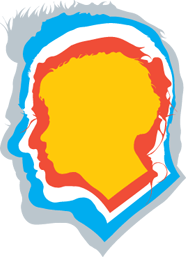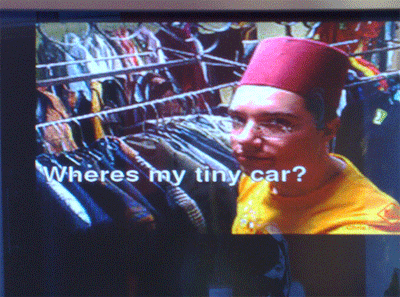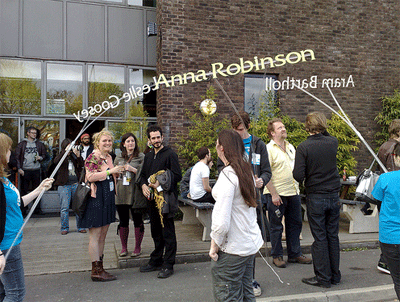
As I enter the conference space, I wonder if I'll be tempted to update my Facebook status constantly at Futuresonic '08. Many of my Facebook friends are here, but still I can't resist tapping on my EeePC from time to time: Michelle is happy in Manchester. Michelle has an idea. Michelle is in love with Dirt Party! Michelle is taking a leisurely pace.
Right now, I suppose I should change my status to: Michelle is writing a review of Futuresonic 08, a five-day festival of art, music, and ideas in Manchester, UK. Futuresonic is an established festival that often showcases emerging issues in creative industries, and this year's topic "The Social" took form both online and offline, and sometimes in between. To set the tone, Festival Director Drew Hemment "remixed" a slogan from Paris '68:
Web 2.0...
I take part
you take part
he takes part
we take part
you all take part
they profit.
This modified slogan proved to be more of an omen than I had anticipated, with the idea of profit and capital often hovering under the surface in many of the conference sessions. In the Collective Media panel, Jennie Savage presented STAR Radio, an experiment in exploring local space in detail by operating a radio station. At the end of the session, a question was asked that seemed dissonant to my ears: How was the project funded, and if she had a blank check, what would Ms. Savage do with the project? Clearly a bit taken aback, Ms. Savage offered a noncommittal reply and later, the gentleman who posed the question was revealed to be a representative from Panasonic, perhaps there on a mission to seek out the next big breakthrough.
At no other conference has it been more explicitly clear to me how practitioners and corporate types alike have become aware of the economic potential of the creative ideas presented in forums like Futuresonic. Many of the attendees were involved in start-ups, and there were also a small handful of people like the Panasonic rep. During another session, an audience member asked a start-up owner if he would consider implementing a certain kind of feature for its users. The suggestion, which was to allow users who wish to temporarily quit the service to encrypt their data until they reactivate their account, was met with a gleeful cry: "What a great idea! Of course we will implement something like that!" Ideas flow freely, especially in our socially networked world, but participants from the private sector benefited from having a brain trust of a few dozen of the most curious and engaged minds present. It seemed unfair that they did not have to pay for the privilege of such expert counsel, and perhaps organizers will take this into account when considering a future revenue model.

Out in the foyer between sessions, I was startled to catch a glimpse of myself on a plasma screen. Over a snapshot of me in an Edinburgh pub was a caption that read: "Michelle exploring how truth and fiction are articulated within locative arts." It was up for a few seconds, then replaced by an image of another conference-goer, with an equally inscrutable caption. It turns out that I was looking at Dirt Party, "…an installation/performance where gossip and photos ("dirt") are dug up about people at a particular social event (in this case, Futuresonic '08) using the internet and real-world reporting." Calling it "essentially lolcats about particular people," the concept was lighthearted and easy to grasp.
Soon after Dirt Party, I walked into Justin Hall's keynote on his PMOG (Passively Multiplayer Online Gaming) project. Once installed, the PMOG system tracks your web surfing habits and points are earned for particular surfing actions. Extensive logs of your web surfing are, by necessity, kept and badges and prizes are given for certain behaviors, such as not visiting Google for a period of time. You can also leave "bombs" at certain sites which will surprise your PMOG-playing friends and subtract points from their total. It is also possible to use the system to create "trails" of links on certain topics for your friends to discover and follow. During his talk, Mr. Hall charismatically suggested a "sausage trail," beginning at the website for a large UK supermarket chain, which got a laugh from the audience.
The labor of setting up a sausage trail on PMOG aside, the project posits a form of hyper-efficiency: play games by doing what you would anyway, which is surf the web. On the flipside, I found the astounding level of vanity and the system of rewards for doing extremely little somewhat troubling. I was also reminded of how, when the anti-video game lobbyists decry violent video games because they believe they will influence people to behave violently in real life, they are usually silenced by the "everyone knows it's just a game" contingent. In this case, life -- at the very least, life spent in front of the computer -- is the game, and just as I have the option to give up real dollars to purchase virtual Facebook gifts, I can spend real time surfing websites and earning virtual trophies. This fact still does not necessarily support a thesis about violence in the real world emerging from gaming, but as these two worlds increasingly slide together, one can be certain more questions will be asked, not fewer.

The virtual crossing over into the real was at the crux of each of the many works presented by artist Aram Bartholl at Futuresonic. In his piece WoW, participants are trailed by volunteers carrying poles bearing hand-cut letters spelling the participant's name over their heads, World of Warcraft style. The hilarity of the sight combined with the knowledge that some of the "jobs" that people perform in Warcraft to earn gold are just as absurd as holding someone's name over their head provided a flash of insight and was amusing, but ultimately lead me back to the real-money-for-Facebook-gifts, real-surfing-for-PMOG-prizes question: are we content to trade time, money, and privacy for such meager rewards?
In Clay Shirky's recent essay about "cognitive surplus", he provides insight into the issue of what we do with our time (essentially our "cognitive surplus"), and what we choose to create with it or not. Referring to the use of time "pretending to be an elf" in World of Warcraft and watching the sitcom Gilligan's Island, Shirky says: "However lousy it is to sit in your basement and pretend to be an elf, I can tell you from personal experience it's worse to sit in your basement trying to figure if Ginger or Mary Ann is cuter." Shirky goes on to say: "It's better to do something than to do nothing. Even lolcats, even cute pictures of kittens made even cuter with the addition of cute captions, hold out an invitation to participation. When you see a lolcat, one of the things it says to the viewer is, "If you have some sans-serif fonts on your computer, you can play this game, too." And that message--I can do that, too--is a big change."
This sentiment is very true and much of the content at Futuresonic reinforced this "I can do it too" notion. A primary example, and one that is also heavily referenced in Shirky's essay, is the ability of anyone who is online to edit Wikipedia, and the impressive number of hours that have been spent doing so to date. Within Wikipedia (which is lauded, and rightly so, as an open, collaborative exercise), the nameless masses engaged in the repetitive work necessary for the site far outnumber the select few who meet the prerequisite notability standards for a Wikipedia entry. "Notability" on Wikipedia is defined in a lengthy document that says, in part: "Notability is distinct from "fame", "importance", or "popularity", although these may positively correlate with it. […] The common theme in the notability guidelines is the requirement for verifiable objective evidence to support a claim of notability." Therein is the rub: We can all participate, pretending to be elves and collecting virtual gifts and prizes, but at the end of the day, very few of us are notable. The concept of notability as we know it today conjures up images of Nobel Prize winners and [insert star of internet meme here] in the same thought bubble. Internet memes, circulated and perpetuated by the very same social networking methods examined at this conference, are in fact the eye of the needle that some of us who will never win Nobel Prizes might try to wiggle through, perhaps by humiliating ourselves, to obtain this elusive notability.
At this point, I should change my Facebook status again: Michelle is no longer writing about Futuresonic, but about all the issues raised by its theme "The Social." While this is true, the panoply of issues are far too critical to our time and important for all of us -- since I take part, you take part, and someone else profits -- to ignore.
Michelle Kasprzak is a curator, writer, and orator based in Edinburgh. Michelle has exhibited and lectured across North America and Europe. She has appeared in numerous publications and on radio and television broadcasts including BBC Scotland, BBC Wales, CBC national, and other programs syndicated worldwide. She completed her MA in Visual and Media Arts from the Université du Québec à Montréal in spring of 2006, and later that year was awarded a curatorial research residency at the Nordic Institute for Contemporary Art in Helsinki, Finland.

